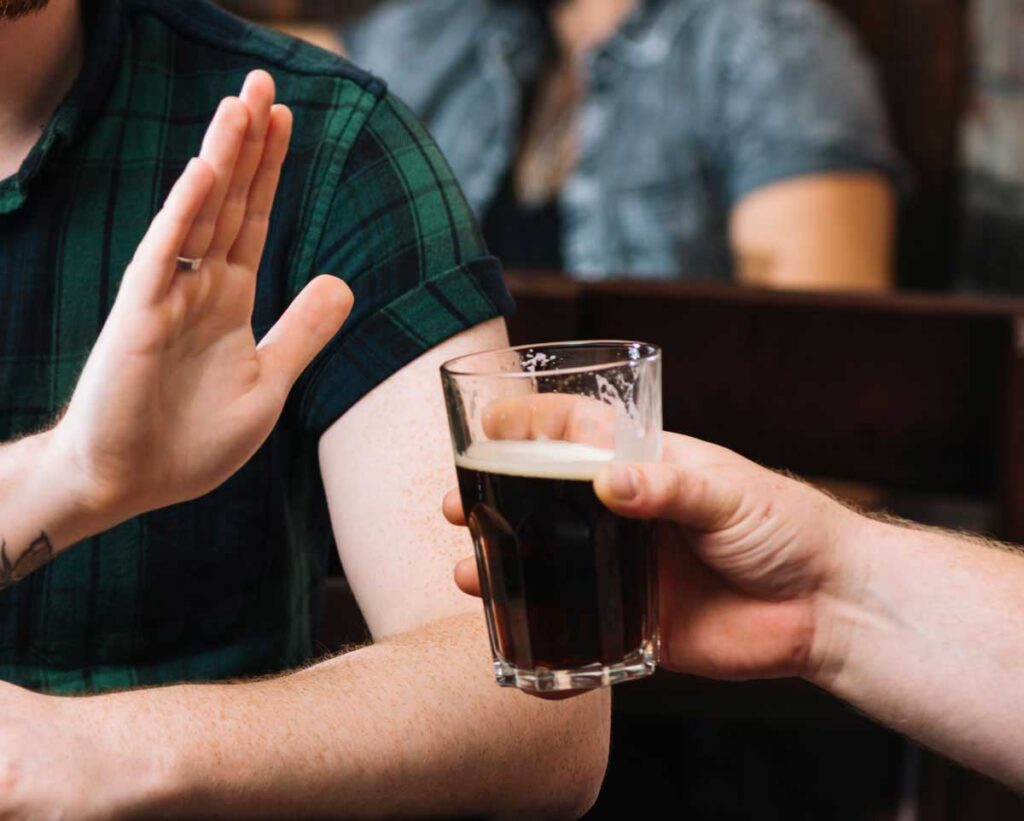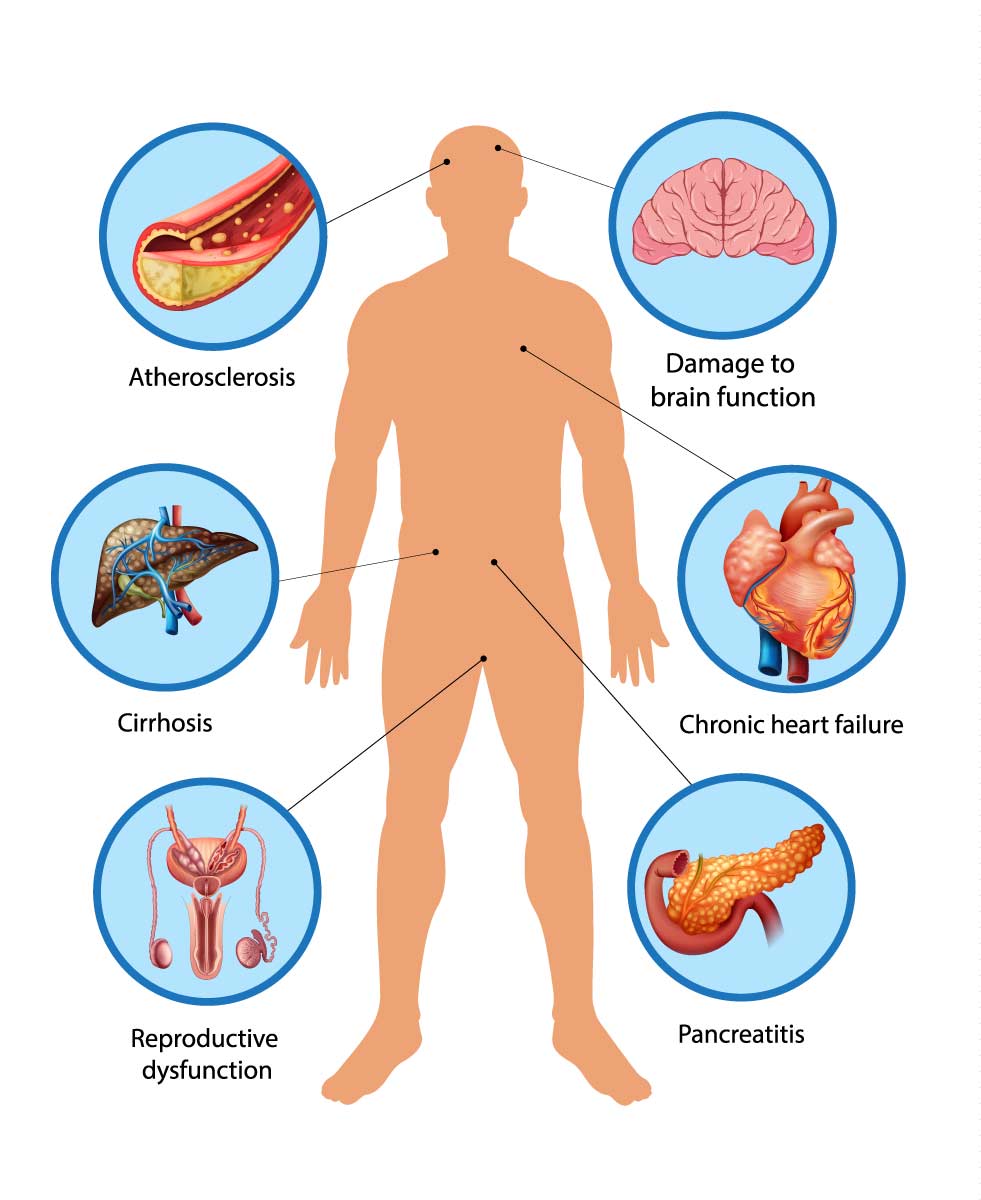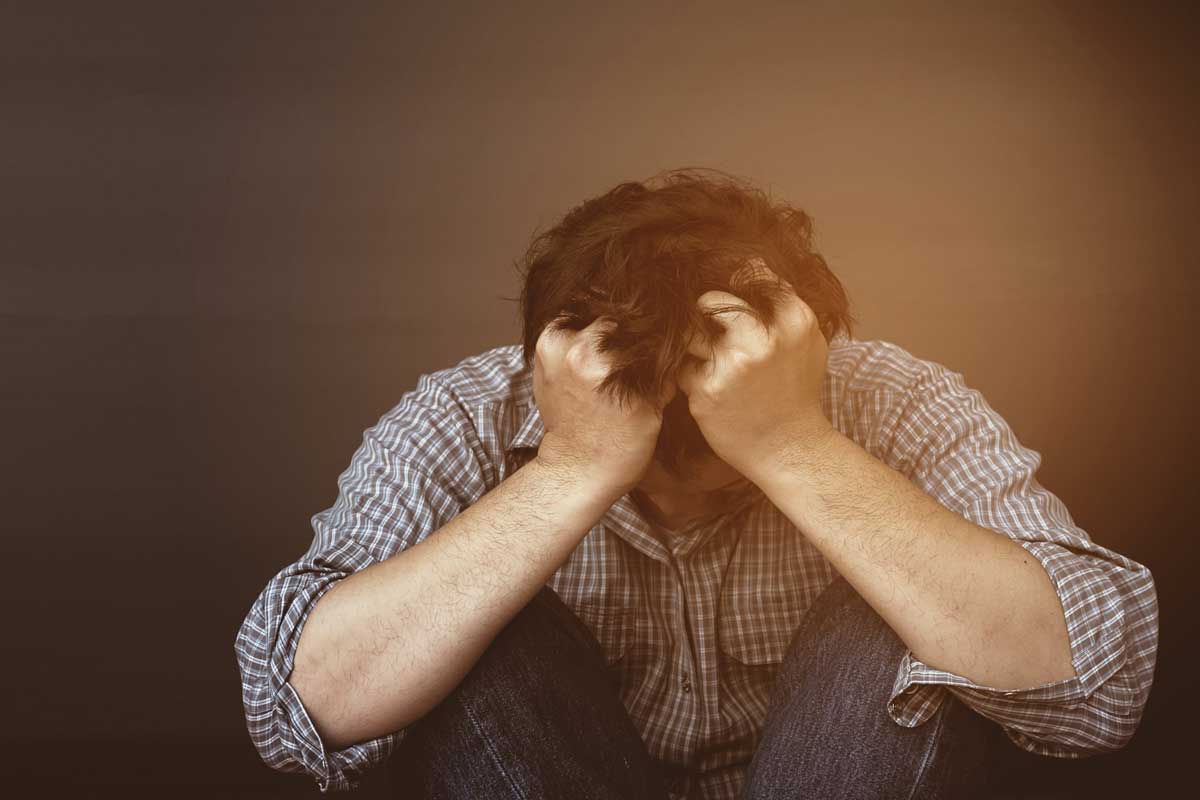
Alcoholism, the Effects of Alcohol Addiction and Rehabilitation
Alcohol is a depressant which slows down the messages travelling between your brain and your body. This affects everything from how you think and feel to how you behave.
Alcoholism or alcohol addiction is when a person becomes reliant on alcohol and continues to use it, despite the harmful behaviours associated with it. It can have serious implications for physical and mental health, relationships, finances, and social behaviours.
Alcohol Rehabilitation begins here. Contact Seahaven today.
At Seahaven, our alcohol rehabilitation program aims to teach you the necessary skills to best support your recovery and ongoing management. We provide accessible, evidence-based tools to help:
- manage addictive behaviours
- make healthy choices
move toward resilience, peace, and success in life. We believe that change and growth are possible in all individuals if they are committed to recovery.

Physical Effects
Many physical changes can occur from alcohol addiction:
- ataxia (the loss of control of bodily movements)
- cancer
- stomach problems
- pancreatitis
- rapid weight gain or loss
- depleted grey matter in the brain.
Every cell in the body needs vitamin B1 (thiamine) to function. It converts food into energy in the brain, nerves, and heart. It helps the body process fats and proteins and aid in the breakdown of carbohydrates.
Your body cannot produce thiamine on its own; you must ingest it through diet. People who struggle with alcoholism are at risk of thiamine deficiency as alcohol reduces the body’s ability to absorb vitamins. Those with alcoholism often only get their daily calorie intake through alcohol consumption instead of food.
Without thiamine, the brain cannot process glucose, robbing the brain of energy and functioning abilities. This can lead to a serious neurological disorder known as ‘wet brain syndrome’, better known in the medical community as Wernicke-Korsakoff Syndrome.
Information adapted from: Betty Ford Clinic

Mental Effects
Some psychological effects from alcohol addiction may include:
- depression and anxiety
- tolerance and increased use
- impaired learning and memory capabilities
- interrupted brain development
- alcohol-induced bipolar disorder
- alcohol-induced sleep disorder.
One of the main problems associated with using alcohol to deal with mental health problems is that regular consumption of alcohol changes the brain’s chemistry. It decreases the brain’s chemical serotonin levels – a key chemical in depression.
As a result of this depletion, a cyclical process begins where one drinks to relieve depression. But it may cause more serotonin depletion, then more alcohol to medicate the depression, and the cycle continues.
Information adapted from: mentalhealth.org.

Financial Effects
You may not realise that your drinking is causing financial problems until they become severe. The total direct costs associated with alcohol use in Australia in 2010 amounted to $13.4 billion. This includes decreased productivity and absenteeism at work, road traffic accidents, healthcare costs and crime (aihw.gov.au).
The direct personal financial problems drinking can cause are:
- loss of employment
- large amount of money spent on alcohol
- purchasing unnecessary food items
- impulse online shopping
- spending money you should not such as rent/mortgage
- legal fees.

Social Effects
Alcohol can reduce your inhibitions leading you to behave in ways you may not usually. You may wake up the next day full of regret for what you did the night before. Alcohol can impact more than the drinker. For example, drink driving accidents and physical aggression.
Some social behaviours resulting from alcohol addiction may include:
- committing a crime
- doing something embarrassing
- starting a physical fight
- engaging in risky sexual behaviour
- behaving in an anti-social way
- drinking and driving.

Relationship Effects
When addiction takes hold, our partner may feel betrayed. The lies, broken promises, false hope, conflict, financial insecurity, and dysfunction that may come with active addiction can cause chaos and emotional upheaval.
Living with the uncertainty of the situation can feel like ‘skating on thin ice’. It can also be a very lonely experience when the person you have committed to cannot be fully present in the relationship.
Information adapted from hazeldonbettyford.org.
Alcohol can play a significant role in violence and assaults – including domestic, family and intimate partner violence. It can be the case that both the offender and the victim have been drinking.
Heavy drinking has been strongly linked to violence between partners. Alcohol misuse by parents is a key risk factor for child abuse and neglect.
The Stages of Alcohol Addiction and Rehabilitation: Recognising the Signs
Alcohol addiction is a progression, and there is a vicious cycle associated with obsessive drinking, with much to lose along the way if people do not seek help. Life can worsen if the cycle of dependence is not broken; however, it can improve during recovery.
Step 1: Pre-Alcoholic
Do you drink to feel better about yourself? Do you drink to dull the pain?
Do you drink to forget, stop worrying, or eliminate anxiety?
If so, your drinking could escalate without help.
Step 2: Early Alcoholic
Blacking out from drinking too much is a warning sign of this stage.
Along with lying about drinking, drinking excessively, and thinking obsessively about drinking.
Stage 3: Middle Alcoholic
At this point, it is obvious to those close to you that you are struggling.
You might miss work, forget to pick up the kids and become irritable easily.
Physical signs of alcohol abuse become obvious – facial redness, weight gain or loss, Sluggishness and stomach bloating.
Support groups can be highly beneficial in this stage.
Stage 4: Late Alcoholic
At this stage, drinking has become everything in your life, even at the expense of your livelihood, your health, and your relationships.
Attempts to stop drinking can result in tremors or hallucinations; however, therapy, detox and rehab can help you get your life back.
Stage 5: Alcohol Rehabilitation
Once stabilised, the goal is to transition from detox to treatment. Then from treatment to maintenance (practising sober living by changing your life) and transcendence – the final step in the path to recovery and beating alcohol addiction.
Information above provided by hazeldonbettyford.com

Solution
According to the Australian Institute of Health and Welfare, in 2017, there were 4,186 alcohol-related deaths in Australia.
Alcohol rehabilitation is possible.
If you think you or a loved one may be showing signs of alcoholism, it is not likely to go away on its own. We are here to help.
At Seahaven Private, we want to build your skills and a community of support around you for the best recovery journey possible. We provide clients with accessible, evidence-based tools to help:
• manage addictive behaviours
• make healthy choices
• move toward resilience, peace, and success in life.
We believe that change and growth are possible for everyone as long as they are committed to recovery. We acknowledge the diversity in the nature of individuals and the many aspects of their lives; physical, psychological, spiritual and social.
We tailor our drug and alcohol rehab programs to each client’s individual needs. Taking a holistic approach, we aim to address the underlying issues driving addiction.
Looking for Addiction Rehab Support?
If you or a loved one are struggling with addiction, let Seahaven guide you to a place of safety and recovery. Our rehab retreat is a sanctuary from the turmoil of living with alcohol or other drug addiction.
We are here to help.
or
Email: contact@seahaven.com.au
Find out more about our Day Program & Residential Program.
Contact Us Today

